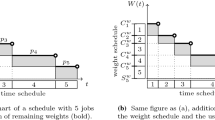Abstract
We argue the importance of studying service systems in which the successful completion of job/customer service cannot be observed contemporaneously. Military and other applications are cited. The allocation of a large amount of processing to a job may make its (unobservable) successful completion more likely but will impose a burden on other jobs awaiting service. A fixed-time schedule specifies both the order in which jobs should be processed and how much processing each should receive. The goal is to find schedules which maximise the total expected reward earned from all jobs served. While this problem is intractable in general, a range of characterisations of optimal fixed-time schedules is achieved for given scenarios. The development of effective heuristics is also discussed.
Similar content being viewed by others
Author information
Authors and Affiliations
Corresponding author
Additional information
Received: November 2004 / Revised: January 2005
In honour of the 60th birthday of Professor Ulrich Rieder
Rights and permissions
About this article
Cite this article
Glazebrook, K., Punton, E. Fixed-time schedules for the processing of jobs when service completions are not observable. Math Meth Oper Res 62, 77–97 (2005). https://doi.org/10.1007/s00186-005-0442-5
Issue Date:
DOI: https://doi.org/10.1007/s00186-005-0442-5




